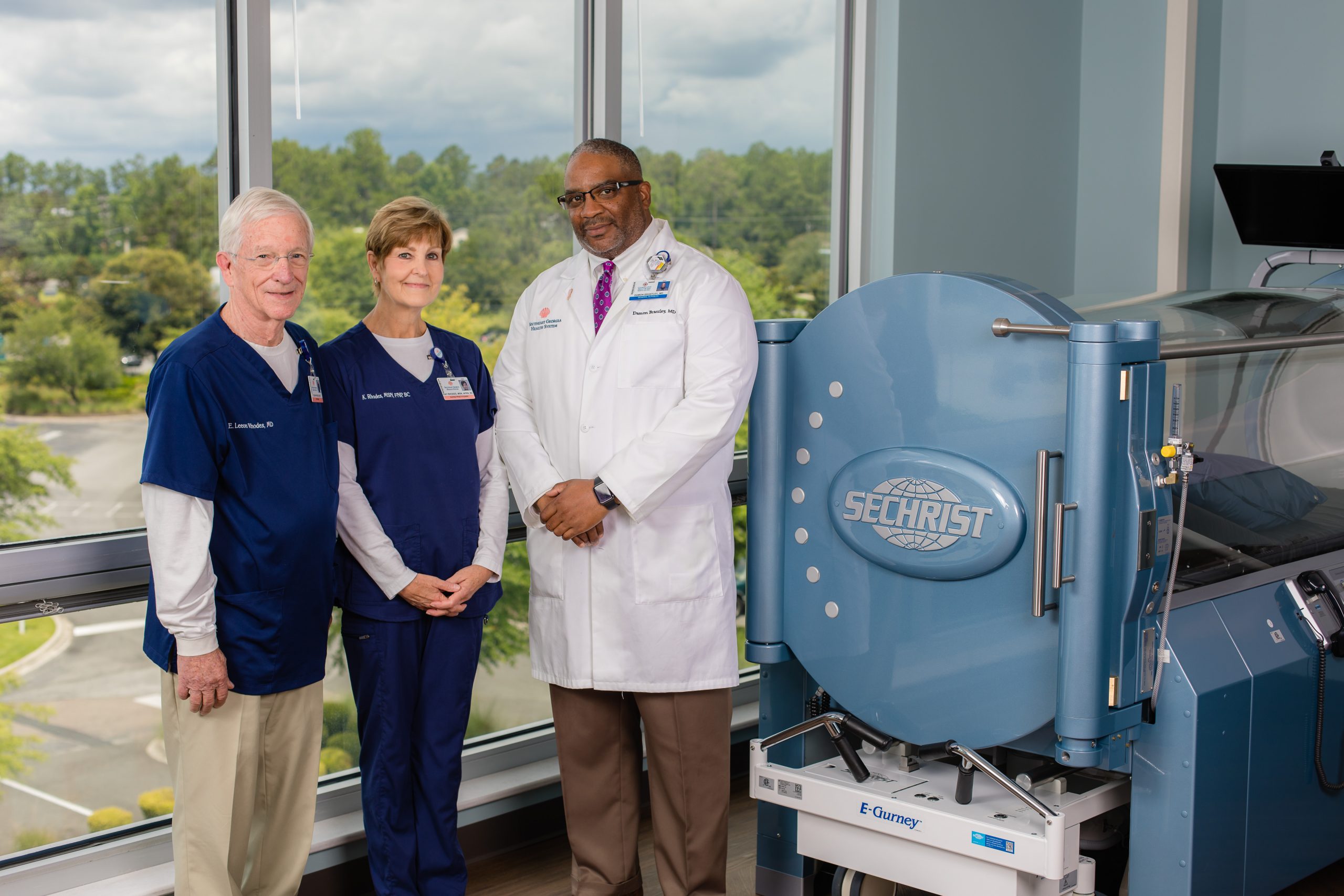
Healing Big Wounds with a Small-Town Touch
ST. MARYS, Georgia: November 24, 2021 – Amidst a global pandemic, Camden County made a healthy leap forward. Southeast Georgia Health System opened a Wound Care Center on its Camden Campus in the summer of 2020, and St. Marys and its surrounding communities have benefitted ever since.
The Center helps individuals with non-healing or slow-healing wounds—often the result of diabetes, injury, radiation, poor circulation, infection, or a pressure sore.
“We have the expertise, services, and technologies necessary to heal wounds that haven’t responded to previous medical treatment,” says Edgar Leeon Rhodes II, M.D., board-certified vascular surgeon, and wound care expert. “We are thrilled to have the opportunity to bring a remarkable range of therapies to a small community.”
The Health System opened the Wound Care Center in the midst of the COVID-19 crises, knowing that quality care can’t be compromised, even during a pandemic. Rhodes and his wife, Kay Rhodes, FNP-BC, a nurse who also specializes in wound care, lead a staff of four patient-care providers trained to deliver this specialized type of care.
A Multi-tiered Approach to Healing
The Wound Care Center features a variety of specialized treatments not available in a regular doctor’s office or in-patient hospital setting. These therapies improve quality of life, function, and mobility, and in extreme cases, can even prevent amputation.
These advanced treatment options include:
- Hyperbaric Oxygen Therapy (HBOT): While comfortably resting inside a pressurized HBOT chamber, the patient breathes in high levels of oxygen. This delivers increased oxygen to stubborn wounds, repairing damaged tissues and encouraging the body’s natural ability to heal itself. HBOT is also used to treat “the bends” or decompression sickness, carbon monoxide poisoning, gangrene and infections.
- Negative pressure wound therapy: Also known as vacuum-assisted wound closure, these wound dressing systems intermittently or continuously apply pressure to a wound to promote healing.
- Growth factor therapy: This therapy stimulates cell growth and promotes wound healing. It can be applied directly to a wound, injected or used in a wound dressing or skin graft.
- Bioengineered skin substitutes: Some patients benefit from artificial skin graft formulas because they are readily available, more comfortable and present fewer complications than actual skin grafts.
- Biological and biosynthetic dressings: Used in wound dressings, these compounds promote cell and capillary growth, which speeds healing.
- Total contact casting: These special casts are designed to take weight off of the foot for patients who have diabetic foot ulcers. Reducing weight or pressure on the foot is essential in treating ulcers.
Additionally, the Center provides standard wound care treatments, including debridement (the removal of dead skin and tissue), pain management, lab tests, nutritional counseling and infection management.
The Power of Partnerships
Identical to the Health System’s Wound Care Center in Brunswick, the Camden Campus location operates in partnership with Healogics, a recognized leader in wound care. “The Health System’s dedication to delivering excellent wound care in our rural community underscores their commitment to evidence-based medical solutions,” says Rhodes, adding, “By affiliating with Healogics, we give patients a level of care typically found only in major cities.”
Access to high-level service is crucial because problem wounds require consistent care and observation to prevent complications. Both Wound Care Centers offer consistent, compassionate care without requiring a drive to Savannah or Jacksonville. That’s especially important for elderly patients, diabetics and anyone recovering from a traumatic injury. In fact, patients regularly comment that having advanced outpatient treatments close to home allows them to focus on their healing.
Rhodes urges the public not to delay in receiving care if they are suffering from a wound that refuses to heal. “Chronic or non-healing wounds require a finely-tuned treatment plan. Our team’s expertise is complemented by having all the tools and technology we need, right here in Camden County.”
The Wound Care Center in St. Marys was partly made possible thanks to taxpayers who participated in the Georgia HEART rural hospital tax credit program. The program increases access to health care by allowing taxpayers to redirect their Georgia state taxes to rural hospitals and receive a 100% state tax credit. To learn more, visit www.georgiaheart.org.
To schedule an appointment at the Wound Care Center in St. Marys, call 912-540-6802, or visit sghs.org/woundcare to learn more.

Photo: Edgar Leeon Rhodes II, M.D., Kay Rhodes, FNP-BC, Wound Care Center, and Damon Brantley, M.D, Southeast Georgia Physician Associates-General Surgery
About Southeast Georgia Health System
Southeast Georgia Health System is a not-for-profit health system comprised of two acute care hospitals, two long term care facilities, two comprehensive Cancer Care Centers and multiple specialty care centers, including orthopedic and spine care, joint replacement, breast care, maternity, outpatient rehabilitation, sleep management and wound care. The Brunswick Campus Cancer Care Center is accredited by the American College of Surgeons Commission on Cancer and offers the only CyberKnife® M6 with MLC technology in Georgia. Additionally, the Southeast Georgia Physician Associates medical group includes more than 140 providers working in 20 different medical specialties at more than 50 locations. The Health System is part of Coastal Community Health, a regional affiliation between Baptist Health and Southeast Georgia Health System forming a highly integrated hospital network focused on significant initiatives designed to enhance the quality and value of care provided to our contiguous communities. For more information, visit sghs.org.

